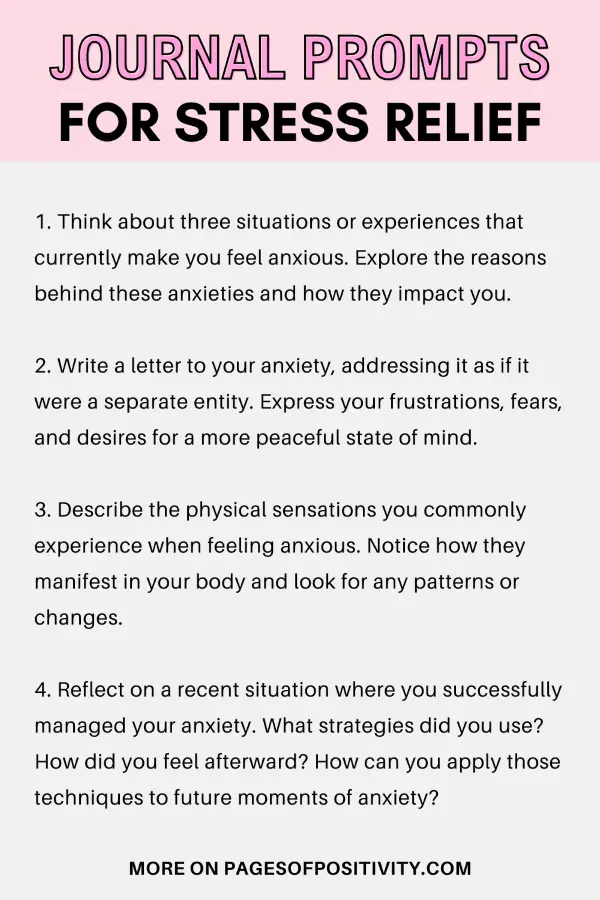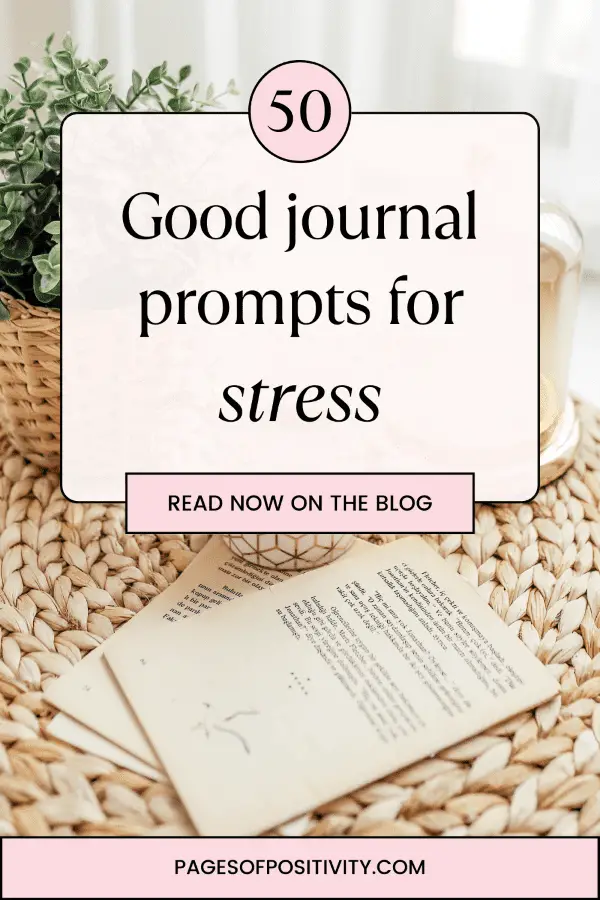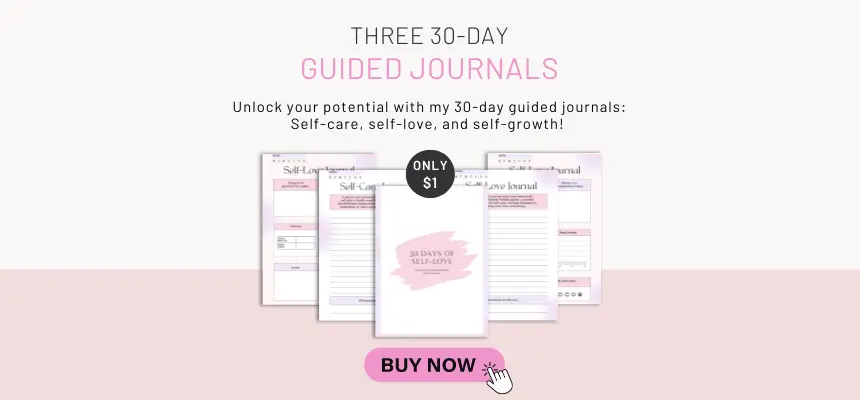60 good journaling prompts for stress relief
I’m excited to share with you journal prompts for stress relief. Life can get overwhelming at times. Finding healthy outlets to cope with stress is crucial. That’s where the magic of journaling comes in!
In this blog post, I’ll be your guide, offering unique and effective journal prompts for stress relief that will help you unwind, reflect, and find solace amidst the chaos.
Get ready to unleash your inner wordsmith and let the healing power of journaling transform your life!


This post may contain affiliate links. That is, if you click on a link and buy something I recommend, I will receive a small compensation at no additional cost to you.
60 calming journal prompts for stress and anxiety
15 journal prompts for anxiety
- Think about three situations or experiences that currently make you feel anxious. Explore the reasons behind these anxieties and how they impact you.
- Write a letter to your anxiety, addressing it as if it were a separate entity. Express your frustrations, fears, and desires for a more peaceful state of mind.
- Describe the physical sensations you commonly experience when feeling anxious. Notice how they manifest in your body, and look for any patterns or changes.
- Reflect on a recent situation where you successfully managed your anxiety. What strategies did you use? How did you feel afterward? How can you apply those techniques to future moments of anxiety?
- Write down three things you can do to create a calming environment when you’re feeling anxious. This could include activities, places, or people that bring you comfort and help alleviate your anxiety.
- Explore your self-talk during anxious moments. Are there recurring negative or self-critical thoughts? Challenge those thoughts and reframe them with positive and supportive statements.
- Make a list of self-care practices that specifically help alleviate your anxiety. These can include deep breathing exercises, meditation, engaging in hobbies, or spending time in nature.
- Describe a situation where your anxiety prevented you from pursuing something you wanted. Reflect on how it made you feel and explore strategies you can use in the future to overcome similar challenges.
- Write a gratitude list, focusing on things that bring you peace and joy. Shift your attention to the positive aspects of your life to counteract anxious thoughts.
- Describe a coping mechanism that has worked well for you in managing anxiety. Explain why it is effective and consider how you can incorporate it into your daily routine.
- Write about a supportive person in your life who understands your anxiety. How have they helped you during challenging times? Express gratitude for their presence and describe how their support makes a difference.
- Explore any recurring fears or worries that contribute to your anxiety. Challenge their validity and brainstorm alternative perspectives that can help reduce their influence over you.
- Write a letter to your future self, reminding them of the strength they have shown in overcoming anxiety. Encourage yourself and offer words of wisdom and support.
- Describe a safe space or mental haven you can visualize when anxiety arises. Paint a vivid picture of this calming place and explore the sensory details that make it soothing.
- Reflect on the progress you have made in managing your anxiety. Write about the small victories and milestones you have achieved along the way, celebrating your growth and resilience.
You might also like: The best journal prompts to try in relationships
15 journaling prompts for stress
- Think about the things that are currently causing you stress and describe them in detail. Identify which aspects of these situations or challenges you can control and which ones are beyond your control.
- Reflect on a time when you successfully managed a stressful situation. Describe the strategies you used, how you felt afterward, and how you can apply those techniques to your current sources of stress.
- Write about three activities or practices that help you relax and reduce stress. How do they make you feel? How can you incorporate them more regularly into your routine?
- Explore any negative thought patterns or beliefs that contribute to your stress. Challenge them and reframe them with positive and empowering statements.
- Make a list of the people in your support network, such as friends, family, or professionals, who can offer guidance during stressful times. Describe how you can reach out to them for support.
- Reflect on your self-care routine and identify areas where you can improve or prioritize to better manage stress. Write about specific self-care practices you can include in your daily life.
- Describe a calming visualization or mental image that helps you relax. Take yourself on a journey to a peaceful place, and vividly describe the sensory details that bring you peace.
- Explore the role of exercise in managing stress. Write about your favorite physical activities and how they help you release tension and improve your mood.
- Reflect on your sleep habits and how they impact your stress levels. Describe any changes you can make to prioritize restful and rejuvenating sleep.
- Write a letter to your future self, offering words of encouragement and support during stressful times. Remind yourself of your inner strength and resilience.
- Create a list of boundaries you can set to protect your well-being and reduce stress. Describe how enforcing these boundaries can have a positive impact on your life.
- Explore gratitude as a tool for stress relief. Write about three things you are grateful for in your life right now and how they bring you joy and peace.
- Describe a hobby or creative outlet that gives you a sense of calm and flow. How can you incorporate more of this activity into your daily or weekly routine?
- Reflect on your relationship with time and productivity. Are you putting too much pressure on yourself? Explore ways to create a healthier balance and reduce stress related to managing your time.
- Write about a lesson or wisdom you have gained from previous stressful experiences. How can you apply this knowledge to navigate your current sources of stress with greater resilience?
You might also like: Spiritual journal prompts for some self-reflection
15 journal prompts for mental health
- Think about how stress affects your body and emotions. Describe strategies to manage and reduce these symptoms and improve your overall well-being.
- Write about the specific things that make you more stressed. How can you set boundaries or use coping techniques to minimize their impact on your mental health?
- Describe three compassionate statements you can tell yourself when you’re stressed. How can you develop a kind and supportive inner voice?
- Explore how your perfectionism or high expectations may contribute to your stress. How can you change your perspective and find a more balanced way to deal with stress?
- Write about a time when you felt overwhelmed by stress but found moments of calm and strength. What strategies did you use? How can you apply those lessons to your current challenges?
- Reflect on the importance of self-care in managing stress and taking care of your mental health. Describe specific self-care practices that work for you and find ways to prioritize them in your daily life.
- Write a letter to your stress, expressing your frustrations and setting boundaries. Describe how you plan to take control and prioritize your mental well-being.
- Think about the support systems available to you when you’re stressed. Describe the people or communities that can offer emotional support, and find ways to nurture those connections.
- Write about a positive way to cope with stress or an activity that improves your mental health. How can you incorporate it into your routine more often?
- Explore how you perceive control in stressful situations. Describe how you can focus on what you can control while accepting and letting go of what you can’t.
- Think about how stress affects your sleep and overall rest. Describe ways to improve your sleep habits and create a relaxing routine before bed.
- Write about mindfulness or meditation practices that help you relieve stress. How do they help you feel more present and calm during stressful times?
- Describe three healthy limits you can set with work or personal responsibilities to reduce stress and prioritize your mental well-being. How can you effectively communicate and maintain these boundaries?
- Reflect on the importance of gratitude and how it impacts your mental well-being. Write about three things you are grateful for, especially in relation to stress or difficult situations.
- Explore the role of professional help or therapy in managing stress and promoting mental health. Write about any experiences, thoughts, or questions you have about seeking support when you need it.
You might also like: Powerful money mindset journal prompts to improve your finances

15 journal prompts for overthinking
- Think about a time when you couldn’t stop thinking about something. What were the thoughts or situations that kept occupying your mind? How did this excessive thinking make you feel stressed?
- Write about how thinking too much affects your overall well-being and stress levels. How does it influence your mood, sleep, and ability to concentrate? Think of ways to handle and reduce excessive thinking.
- Describe three common triggers or patterns that often lead to overthinking and increased stress. How can you become more aware of these triggers and develop strategies to stop yourself from overthinking?
- Think about how perfectionism and excessive thinking are connected. How does the desire for control or fear of making mistakes contribute to your overthinking? Explore ways to be kinder to yourself and accept imperfections.
- Write about a time when overthinking stopped you from taking action or making decisions. How did this affect your stress levels? How can you gain confidence in your decision-making process and trust your instincts?
- Explore how overthinking and self-doubt are related. Describe any negative or self-critical thoughts that arise when you overthink. Challenge these thoughts and develop more empowering and positive beliefs.
- Write a letter to your overthinking mind, expressing your frustrations and setting boundaries. Explain how you plan to regain control and reduce the impact of excessive thinking on your stress levels.
- Think about how mindfulness can help manage overthinking and stress. Describe specific mindfulness practices or techniques that help you focus on the present moment and reduce overthinking.
- Write about a positive phrase or saying that can counteract overthinking and promote calmness. How can you incorporate this affirmation into your daily routine?
- Explore the ideas of acceptance and letting go in relation to overthinking. Describe how you can practice accepting uncertainty and letting go of the constant need for reassurance or answers.
- Write about three healthy distractions or activities that can redirect your attention away from overthinking and reduce stress. How can you include these activities in your daily routine?
- Think about how overthinking affects your relationships and interactions with others. How does it impact your ability to be present and connect with others? Explore strategies for developing more meaningful connections.
- Describe a visualization or imagery exercise that helps calm your overthinking mind. Paint a vivid picture of a peaceful scene that gives you a sense of serenity.
- Write about the importance of self-care in managing overthinking and stress. Describe specific self-care practices that help you relax and restore balance. How can you prioritize self-care in your daily life?
- Reflect on the progress you’ve made in managing overthinking. Write about small accomplishments and insights you’ve gained along the way. Celebrate your growth and resilience in dealing with the challenges of overthinking and stress.
FAQ: Why should you journal?
So, why should you grab that pen and start pouring your thoughts onto paper? Let me tell you, there are so many amazing benefits to journaling that you won’t want to miss out on them.
First and foremost, journaling is an incredible stress-relieving tool. When we write down our thoughts and emotions, we release them from the confines of our minds, giving them a safe space to exist outside of ourselves.
It’s like having a personal confidant who listens without judgment. By putting pen to paper, we can gain a sense of clarity and perspective. This allows us to navigate through our stressors with more ease and grace.
Besides, journaling provides a beautiful opportunity for self-reflection and self-discovery. It’s a chance to explore our thoughts, dreams, and desires in a safe and non-threatening environment.
Through the act of writing, we gain insights into our own patterns, strengths, and areas for growth. Journaling helps us connect with our authentic selves, uncovering hidden treasures within.
Not only that, but journaling also enhances our creativity. It’s a canvas where we can freely express ourselves, experiment with different writing styles, and even dabble in art if we feel inclined.
The blank pages hold endless possibilities for self-expression. This is what makes journaling a delightful and inspiring journey.
Lastly, and perhaps most importantly, journaling is a form of self-care. It’s a moment of stillness and introspection in a fast-paced world.
By taking the time to journal, we honor our emotions, prioritize our mental well-being, and give ourselves the gift of self-love. It’s a beautiful act of nurturing that we all deserve.

FAQ: How do I journal?
Find your perfect journal
Start by choosing a journal that resonates with you. It could be a beautiful notebook, a rustic leather-bound journal, or even a digital journaling app if you prefer writing on your device.
Choose something that sparks joy and makes you excited to put pen to paper.
Create a sacred space
Find a peaceful and comfortable space where you can focus and let your thoughts flow freely. It could be a cozy corner of your home, a serene park bench, or a retro café that inspires your creativity.
Surround yourself with objects or scents that bring you calmness and peace.
Set the mood
Before you begin journaling, take a few moments to set the mood. Light a scented candle, play some soft instrumental music, or sip on a cup of herbal tea.
These simple rituals can help create a relaxing atmosphere and signal to your mind that it’s time to unwind and express yourself.
Start with a brain dump
Start by emptying your mind onto the pages of your journal. Write without judgment or censorship. Let your thoughts, worries, and emotions flow freely.
This is your safe space to release anything that’s weighing you down. It can be messy, chaotic, or even nonsensical. Just let it all out.
You might also like: Good journal prompts about love to help you nurture your relationships
Explore the prompts for inspiration
Make sure to use the journal prompts for stress relief that I gave you before. These are guaranteed to ignite your creativity and reflection.
Be consistent
Make journaling a regular habit. Aim to write at least a few times a week, if not every day. Consistency is key to reaping the full benefits of journaling. Treat it as a sacred ritual—a time dedicated solely to your well-being.
Embrace creativity
Don’t limit yourself to just words. Feel free to incorporate doodles, sketches, or even collages into your journal. Let your creativity flow and experiment with different mediums.
Your journal is a reflection of your unique expression, so make it as vibrant and personalized as you desire.
Embrace vulnerability
Allow yourself to be open and vulnerable on the pages of your journal. It’s a judgment-free zone where you can be completely honest with yourself.
Share your dreams, fears, and aspirations. Celebrate your wins and acknowledge your struggles. Remember, this is a space for growth and self-compassion.
You might also like: The best journal prompts for productivity (I'm not joking)
FAQ: How does journaling help with stress relief?
Ah, stress relief—something we all crave in this fast-paced world. Journaling is a powerful tool that can do wonders for alleviating stress. Let me break it down for you.
Emotional release
When we’re stressed, our minds can become cluttered with a jumble of thoughts and emotions. Journaling provides a safe haven for us to pour out those feelings onto the pages.
It’s like unloading a heavy backpack and lightening the burden on our shoulders.
By giving voice to our emotions through writing, we release pent-up tension, allowing ourselves to feel lighter and more at ease.
Gain perspective
Often, stress can cloud our judgment and make problems appear larger than they actually are. If we try journaling to reduce stress, we gain valuable perspective.
By putting our thoughts and concerns into words, we step back and view them from a different angle.
We may discover that what seemed insurmountable in our minds is actually more manageable when seen in black and white. This shift in perspective helps us find solutions and take proactive steps toward stress reduction.
Problem-solving
Journaling for stress relief is not just about venting. It’s also a space for problem-solving and brainstorming. When we write about our stressors, we naturally tap into our innate problem-solving abilities.
We can jot down potential solutions, explore different perspectives, and create action plans. It’s like having a conversation with ourselves, allowing our inner wisdom to shine through and guide us toward resolution.
Self-reflection and awareness
Journaling encourages self-reflection, a practice that allows us to become more aware of our thoughts, patterns, and triggers. By consistently journaling, we gain insights into what causes our stress and how it affects us.
This self-awareness empowers us to make conscious choices, set boundaries, and implement self-care practices that prevent stress from accumulating in the first place.
It’s a beautiful journey of self-discovery and personal growth.
Gratitude and positivity
Amidst the chaos of stress, journaling for stress management can be a powerful reminder of the good things in life.
By incorporating gratitude practices into our journaling routine, we shift our focus toward the positive aspects of our day.
We can write about moments that brought us joy, acts of kindness we witnessed, or things we’re grateful for.
This simple act of gratitude uplifts our spirits, cultivates a positive mindset, and counteracts the negative effects of stress.
How often do you use journal prompts for stress relief?

I consider myself an expert when it comes to positive affirmations, journaling, and inspirational quotes. My blog is all about spreading good vibes and helping you feel awesome! I’ve got loads of cool stuff for you to explore, like uplifting affirmations that can boost your confidence, fun journal prompts to spark your creativity, and inspiring quotes to motivate you every day. Let’s embark on this amazing journey together as we discover more about ourselves, uncover our hidden strengths, and create a life that’s full of happiness and success.







